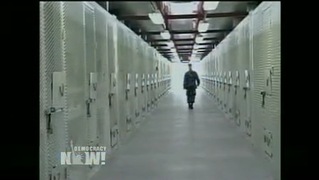
It has been 10 years since the United States began detaining people at its military base in Guantánamo Bay, Cuba. We speak with someone who has worked to defend the rights of those prisoners for the last decade: Michael Ratner, president emeritus of the Center for Constitutional Rights. While dozens continue to face an unknown future at Guantánamo, we ask Ratner to comment on President Obama’s recent approval of the National Defense Authorization Act (NDAA), which some legal experts say would authorize the military to indefinitely jail anyone it considers a terrorism suspect — without charge or trial. “The Center represented the first people out of Guantánamo over 10 years ago. At that time, the detention of people, the military trials, was all done by a presidential order. When Obama took office, he continued the same actions. And recently, in the NDAA, those actions, the ability to detain people, the ability to use military commissions, etc., were actually put into law, and Obama, contrary to his claim that he was going to veto it, signed it, making him the first president ever in the United States to sign into law indefinite detention as part of the policy of the United States.” Ratner adds that “the NDAA puts very heavy restrictions on moving people out of Guantánamo… We are now in the longest period, almost a year, in which nobody has been transferred out of Guantánamo.” [includes rush transcript]
Transcript
AMY GOODMAN: And very quickly, Michael Ratner, you there—you’re there in London as part of this 10th anniversary of the opening of Guantánamo, what you have been fighting for many years here in the United States. Can you talk about the provisions of the National Defense Authorization Act that have just been signed off on by President Obama, the NDAA, that relate to Guantánamo and what you at the Center for Constitutional Rights are calling for?
MICHAEL RATNER: Well, the Center represented the first people out of Guantánamo over 10 years ago. At that time, the detention of people, the military trials, was all done by a presidential order. When Obama took office, he continued the same actions. And recently, in the NDAA, those actions, the ability to detain people, the ability to use military commissions, etc., were actually put into law, and Obama, contrary to his claim that he was going to veto it, signed it, making him the first president ever in the United States to sign into law indefinite detention as part of the policy of the United States.
In addition, of course, the NDAA puts very heavy restrictions on moving people out of Guantánamo: first, moving them to prisons in the United States, no money can be used for that; and secondly moving them to other countries, you need all kinds of certifications. And if you think about it, we are now in the longest period, almost a year, in which nobody has been transferred out of Guantánamo. And it’s likely that until after the election, no one will be transferred out of Guantánamo except for three possible claimed Taliban people, who the Taliban want to go to Qatar if there’s a negotiation with the Taliban. So think about how crazy it is: 171 people there, the only three people who might get out are three essentially acknowledged Taliban people.
But as far as the Center is concerned, when they announced that if Guantánamo—when Guantánamo should be closed in a year, when Obama announced that, we said it’s too long, it should only take three months. Boy, were we naive about what was going to happen. It should still only have taken three months. Now it’s been three years since that promise on January 22nd, and we’re no closer to closing it than we were three years ago or 10 years ago. We’re no closer to ending the policy of indefinite detention than we were three years ago or 10 years ago.
What we’re closer on is public anger and demonstrations about it. So, tomorrow there will be some 350 demonstrations across the world and across the country, saying, “Shut it down. Shut down Guantánamo. Shut down indefinite detention.” And I can only really leave all the listeners out there with this question, this question: if Guantánamo was there, and it was a Christian Guantánamo or if it was a Jewish Guantánamo, do you think we would still have Guantánamo today? We wouldn’t.
AMY GOODMAN: Michael Ratner, Omar Deghayes, I want to thank you both for being with us. Michael Ratner, former president at the Center for Constitutional Rights. Omar Deghayes, former prisoner at Guantánamo, held in U.S. custody for close to five years, spent most of that time at Guantánamo.












Media Options